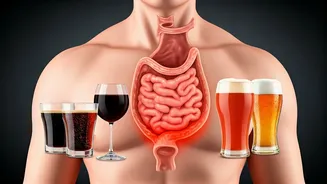Understanding Heartburn Triggers
Heartburn, medically termed as gastroesophageal reflux, arises when stomach acid backs up into the esophagus, producing a burning sensation in the chest.
Various elements can trigger this bothersome issue. The foods and beverages consumed substantially influence the likelihood of heartburn. Understanding the specific triggers, like certain drinks, is crucial for effectively managing this condition. Several common drinks have been identified as potential heartburn instigators. Some cause the lower esophageal sphincter, which acts as a valve between the stomach and esophagus, to relax, allowing acid to escape. Others directly irritate the esophageal lining. Recognizing these factors empowers individuals to make informed choices that reduce discomfort and promote esophageal well-being. By limiting or eliminating these problematic drinks, individuals can often lessen the frequency and intensity of their heartburn symptoms, significantly improving their daily lives.
Tea: A Cautious Approach
While tea can be soothing, certain types may exacerbate heartburn. Peppermint tea, for instance, is notorious for potentially relaxing the lower esophageal sphincter, potentially leading to acid reflux. This can happen because peppermint can interfere with the muscle that keeps stomach contents down. Additionally, teas with high acidity levels, especially citrus-infused varieties, can irritate the esophagus directly. However, it's not a universal experience; some teas, especially herbal ones without added citrus, may not trigger symptoms in all individuals. People susceptible to heartburn must carefully assess their reactions to various tea types. Monitoring personal responses to different tea brews is pivotal in deciding what to incorporate into one's diet. It is advisable to avoid tea altogether and observe any associated improvements to heartburn, while taking steps to include other varieties of tea subsequently and assessing its impact.
Alcohol's Acidic Impact
Alcoholic beverages are well-known heartburn culprits. Alcohol has the dual effect of relaxing the lower esophageal sphincter and increasing stomach acid production. This combination makes it a potent trigger for reflux symptoms. The level of acidity in an alcoholic beverage can also be a key factor. Red wine, with its relatively high acidity, can be especially problematic for susceptible individuals. Beer, particularly if it's carbonated, may also contribute to the issue. Mixed drinks often contain acidic components like fruit juices and sodas, amplifying their potential to cause heartburn. Limiting or abstaining from alcohol can noticeably improve heartburn symptoms for many individuals. It's often beneficial to assess personal tolerance to different alcoholic drinks and their frequency of consumption to determine an appropriate consumption level. Moreover, alcohol can also damage the esophageal lining, making it more vulnerable to acid damage.
Citrus Juices: Acidity Alert
Citrus juices are undeniably acidic. This high acidity can directly irritate the esophageal lining, leading to a burning sensation. Orange juice, grapefruit juice, and other citrus-based beverages have naturally low pH levels, making them acidic and more likely to trigger heartburn. Even a small amount of citrus juice may cause discomfort in sensitive individuals. The acidity levels vary depending on the specific juice and the variety of citrus used. People vulnerable to heartburn often notice a correlation between consuming citrus juices and experiencing symptoms. Swapping these juices with less acidic alternatives, like certain fruit-infused waters or vegetable juices, can be a beneficial step. Carefully observing one's reactions to different juices can help in formulating a personalized dietary strategy that mitigates heartburn symptoms.
Carbonated Drinks: The Fizz Factor
Carbonated drinks, including sodas and sparkling waters, can also cause heartburn. The carbonation itself can contribute to the problem, as the bubbles can increase pressure in the stomach, potentially pushing stomach contents up into the esophagus. Many sodas are also highly acidic, adding another layer of irritation. Even diet sodas that are sugar-free can trigger symptoms due to the presence of artificial sweeteners and carbonation. The high sugar content in regular sodas also may have an impact, with the potential for causing acid reflux. The effect of carbonated beverages varies from person to person. However, many heartburn sufferers discover they feel better when these drinks are eliminated or curtailed. People struggling with heartburn are often urged to switch to non-carbonated beverages. This includes water, herbal teas, or even homemade fruit-infused drinks, which can offer hydration and refreshment without the fizz that might cause distress.
Coffee: A Mixed Bag
Coffee's effect on heartburn is complex and not uniform. Caffeine, a primary component of coffee, can relax the lower esophageal sphincter, letting stomach acid enter the esophagus. Coffee also stimulates the production of stomach acid, potentially compounding the issue. However, individual sensitivity to coffee varies significantly. Some people experience heartburn from drinking even small amounts of coffee, while others tolerate it without any issues. Coffee's acidity is another consideration. Darker roasts tend to be less acidic than lighter roasts, but the impact differs from person to person. Decaffeinated coffee is often seen as a possible solution, as it removes the caffeine while retaining some of the other properties of coffee that may be irritating. People experiencing heartburn should analyze their reactions to coffee. This can involve reducing the amount of coffee consumed, switching to a less acidic roast, or opting for decaffeinated options. Ultimately, evaluating personal responses is crucial for managing coffee consumption.












